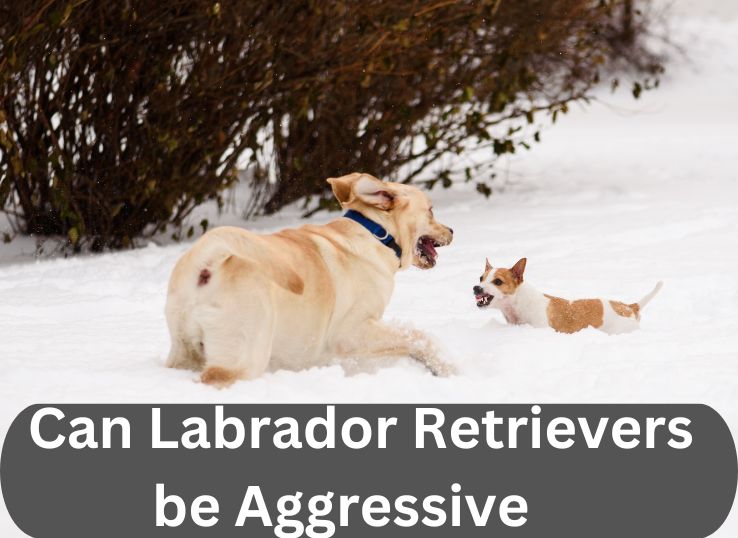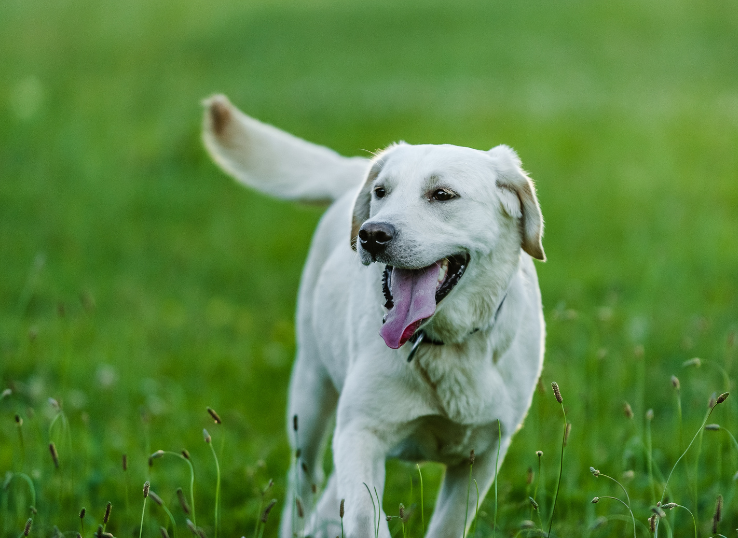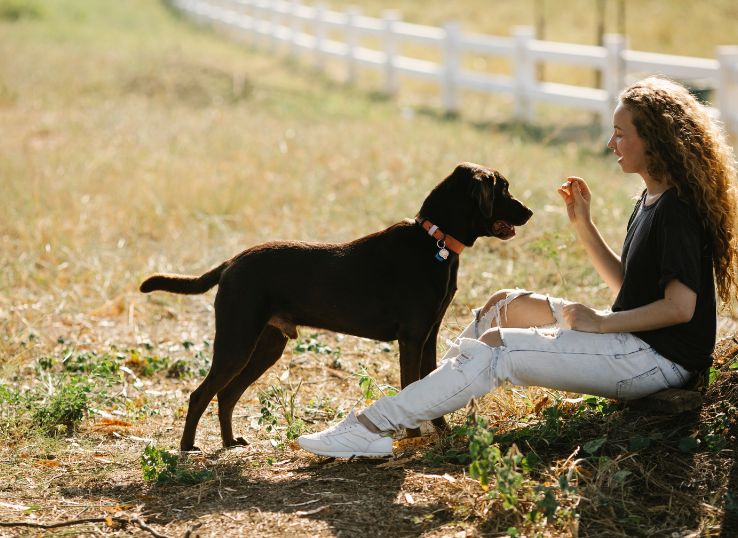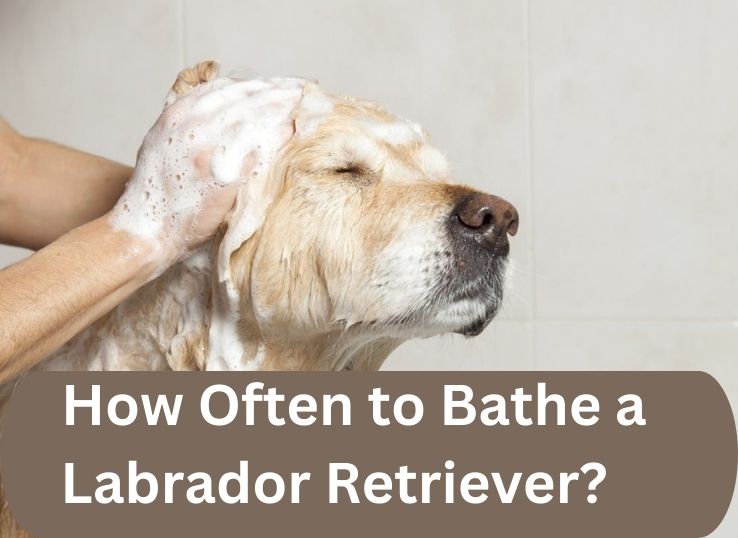Can Labrador Retrievers be Aggressive: 5 Essential Training Tips

Can Labrador retrievers be aggressive dogs? Not usually, although any dog can be oversensitive or even aggressive. A well-loved and appropriately trained Lab is more likely to be a sociable, adaptable, and kind family member compared to an aggressive one.
What can you do to inspire good behavior in your dog from the beginning? How do personality and socialization play an important part in creating a kind dog? And what can you do as a dog’s main caretaker and trainer to inspire a happy, calm, and respectful dog?
I am going to go cover these topics below to aid you in understanding the behavior of Labs and give you some important Ways to Train a Polite Dog.
Table of Contents
Can Labrador retrievers be aggressive? Typical Personality of Labs
Labrador Retrievers are well-known for being a responsive, playful, and tolerant dog breed. They are usually even-tempered, easy-going, and flexible around people and other canines.
Labs are usually bred with characteristics of liveliness, high energy, and a wish to gratify their family members. These are some of the causes why Labradors have been such prevalent dogs for the last 3 decades.
Labs also can be very good canines for families with kids and usually do well in families with other dogs, particularly other dogs. They are frequently protective of their loved ones and family members, and are outstanding watchdogs; however, are frequently too friendly and hospitable to be considered guard canines!
However, the personality of your individual dog, and the environment, will affect their temperament and overall disposition enormously. If you have a Lab who’s been the target of abuse or carelessness, you might see behavior in your dog that isn’t typical of the Lab breed and might be unusual.
This is occasionally seen in rescue Labs, because they have been eliminated from environments where they have not had appropriate love, care, and socialization. These categories of Labs might also have been in circumstances or around individuals or events like fireworks, thunderstorms, and loud concerts that might bring out signs of behavior issues.
Different Signs of Aggressive Behavior in Labs
According to the ASPCA, here are some behaviors you can see in your aggressive dog:
- Attacking an individual or animal
- Severe growling
- Nipping
- Hackle raised
- Biting
- Snapping
- Showing teeth
- Becoming entirely still and rigid
Though Labradors are generally docile and sociable, any dog can become hostile. Any dog can become irritated or triggered by certain situations, and react in ways that could be a safety problem to us or other dogs.
Occasionally events can be prompting for dogs and can cause worry or fear in a Labrador. Although some dogs might run or hide under your bed, and others will respond to fear or nervousness by lashing out and getting aggressive.
Remember, all canines, including lovable Labradors, converse with their mouths (and their teeth) once they want to. This is for communication with people and with other dogs.
If you’re lucky enough to be around newborn Lab puppies, you’ll observe that the mother dog talks with the litter of puppies through her mouth, and the pups communicate with each other by mouthing behaviors too.
How Your Role as a Dog Owner Impacts Your Dog?

Your role as a trainer, dog owner, and main caretaker is critical in creating good behavior from your pooch. It’s significant to teach and model the activities you imagine your dog to follow and show. This is particularly true in families with several dogs.
Labradors are highly smart dogs who usually pick up training rapidly, and are one of the easier dog breeds to train. Begin with training your young pup, you’ll want to start creating a puppy schedule to create steadiness and let a routine that creates a better pattern of predictable behavior from your pooch.
When your dog recognizes the routine that every day brings, and what to imagine from their loved ones, they become more stable members of the family. Dogs that are not given regularity or routine can become more awful and nervous.
If they don’t see when mealtimes usually are, or once they’ll be fed, your pooch might become secured, distressed, and territorial against individuals and other canines.
If your Lab doesn’t become consistent, consistent care and reaction from you or gets mixed messages from family members, they might develop erratic responses to certain human activities. They might learn that people can’t be trusted.
You want your pooch, particularly a new dog to your family, to feel safe and adored in a trusted atmosphere. You don’t need a dog that’s sensitive and unsettled as they don’t recognize what’s going around, or what occurs next.
The more consistency you establish for your dog the more likely your furry friend will be to adjust to the new environment.
Can Labrador retrievers be aggressive? Training Tips for a Calmer Dog
Now that you know the significance of training and your role in influencing your canine’s behavior, what steps can you consider to train for a calmer Lab?
1. Start Basic Dog Commands
Ensure you have a base of good, basic training guidelines with your Lab, starting from the initial few weeks you take your new Lab home. Establish humble guidance and training for your Labrador in a positive, affectionate way which will inspire the best qualities of your Labrador Retriever to appear, for example, cooperation and an enthusiasm to gratify their family members.
Teach your dog to be respectful of all individuals, particularly the kids you might have in your family. Teach your children that any dog could have the ability to become unpredictably aggressive.
2. Keep a Steady Training Routine
I recommend a kind but consistent training routine of just some minutes numerous times a day for young pups. If you’re seeking a great place to start, you can follow Zak George’s dog training videos on YouTube.
Use positive training approaches and lots of admiration and patience for dogs who are in a new environment. Don’t overcome your Lab with awkwardly high demands or hopes, and have tolerance in the learning procedure for your puppy.
3. Appropriate Socialization is Critical
Socializing your pooch is critical to their growth and overall accomplishment as a member of your family.
For pups, as soon as your vet provides you authorization to have your pup around other dogs you can allow your pooch to cautiously socialize in places, such as Puppy Schools or Puppy Obedience Classes.
For older dogs, you can get a beginner dog training class at pet stores. You can take your pooch with you to pet stores that allow canines additional socialization chances under your control.
You need to socialize your dog with welcoming and non-aggressive canines. You don’t need to have negative know-how with another dog that lets your Lab be irritable to other dogs because of their bad experience.
4. Exercise and Activity are Significant
Exercise and activity are important to relax and calm your Lab, and avoid abrupt outbursts. Labs are notorious for being lively dogs who tend to stay pups much longer than numerous other breeds who might “mature” sooner.
Before you choose your Labrador puppy, ensure you’re fully conscious of what to suppose from this breed, as Labradors are fantastic canines, they are not always the calmest breed to get!
5. Monitor Your Lab’s Behavior & Response to New Circumstances
Don’t allow aggressive behavior from your Labrador towards other persons or pets. Although a Labrador might be ready to undertake a squirrel or duck outdoors, they are smart enough to learn that your kid’s toy is not a fair objective.
Be conscious of triggering events for your pooch like fireworks, thunderstorms, or collaboration with other dogs, and have a strategy for how you’re going to be ready ahead of time.
Seek Help for a Hostile Labrador or One Who Won’t Respond to Training

If your Lab appears to respond violently or show aggressive behavior, then you must get help. Don’t overlook problem behavior in your pooch, particularly if you have other family members or other dogs.
Start with your vet to consider any medical or health problems occurring with your pooch. They might also have plans for techniques to respond to your Lab’s hostile behavior and solutions particular to your dog.
Ask your doctor what protections you should consider protecting your other family members and other pets once you’re working on handling the signs of your dog’s behavior.
If you’re working with your Labrador dog rescue organization, you can ask the rescue for assistance and aid on how to manage some of the behavior issues you might be seeing in your canine, as the rescue generally has a wealth of info and experience in controlling dogs indicating difficult behavior.
You can go for seeking a progressive animal behaviorist who might know about training an aggressive Lab. Make sure that you keep your other family members and pets safe from your aggressive dog if they’re showing signs.
Which one is more aggressive male Labrador or female Labrador?
Labrador retrievers often do well with other pets. Male Labradors are occasionally aggressive to other dogs. Female Labs are frequently more polite around other canines. That doesn’t mean that they never act aggressively.
Protective Mothers of the breed can be very defensive as well as aggressive when we talk about keeping their tiny pups safe from strangers. Remember, as well, that all Labradors are different. No two counterparts behave in the same way.
FAQs
Is a Labrador considered an aggressive dog breed?
Your dog’s breed typically has little to do with its deeds, study finds. They’re distinguished stereotypes: besides, Rottweilers and pit bulls are aggressive, whereas Labradors as well as golden retrievers are very friendly.
Are Labs always friendly?
Labradors are not usually considered to be hostile and have gentle, friendly natures. Labradors are a prevalent choice for a family pet, because of their kind and lively spirit. The dog tends to deal well with individuals and other animals alike and these dogs are always all set to make new friends.
Final thoughts
Labradors are not recognized to be aggressive dogs; however, any dog can bite and be hostile. Labs are usually one of the sweetest and most affectionate dog breeds. Your Labrador’s personality will affect much of their collaborations with other individuals and dogs, and your role as a primary trainer will also have a big impact.
Be kind, compassionate, and steady with your training, and keep in mind that socialization and exercise are important for managing a glad, well-adjusted Lab. Seek out help if you think your dog’s behavior is becoming unmanageable, and always be aware of caring for the other individuals and pets around them.






